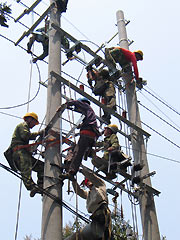|
Power cuts to cast shadow over summer
By Fu Jin (China Daily)
Updated: 2005-05-12 22:36
Economic hubs in East and South China face summer blackouts because of the
continuing power shortage, energy watchdogs warned yesterday.
 |
| Works fix power transmission facilities in Quanzhou, Southeast
China's Fujian Province May 12, 2005.
[newsphoto] | But the situation is expected to be less severe than last year, they said.
Vice-Chairman of the State Electricity Regulatory Commission Shi Yubo
yesterday said the industrial belts of the Yangtze River Delta and the Pearl
River Delta will suffer most.
"Blackouts will definitely take place starting from June," he said.
The gloomy news came as the government announced that nuclear and hydro-power
will top China's new electricity development agenda in the coming years due to
environmental considerations.
However, this will not prevent another summer of disruption.
"Due to the inadequate energy supply, the rest of the country will see
various levels of power shortages, with Northeast China being exception," added
Shi at yesterday's news conference by the State Council Information Office.
Though the capital Beijing will face a shortage of 700,000 kilowatts (kW),
Shi promised blackouts will not be enforced as the city's power companies will
go all out to buy electricity from other power grids.
"Electricity will remain in short supply nationwide, although the shortage of
power will be less acute compared with last year," said Shi.
The maximum shortage of power supply during the coming summer peak-period is
estimated at around 25 million kW, according to the commission.
In the Yangtze River Delta, electricity shortage will reach 12 million kW
this year, as robust economic investment hikes power consumption.
Companies are busy preparing for possible blackouts.
"My institute has prepared a diesel power generator for blackout," said Zhu
Fahua, deputy president of the State Power Environmental Protection Research
Institute. Based in Nanjing, provincial capital of Jiangsu, Zhu's institute is
affiliated with China's major power supplier the State Power Corporation.
He said his institute generated its own power during last summer's power load
peak. "This summer we are going to face the same fate."
Due to rapid economic growth, China has witnessed a dramatic rise in
electricity generation and consumption over the past years.
Statistics show that since the beginning of this year, China's electricity
generation and consumption have continued to outstrip supplies.
From January to March, total power consumption nationwide was 550 billion
kilowatt-hours, an increase of 13.38 per cent over the same period of last year.
Shi said more power stations will be put into operation this year but it
cannot lessen the shortage during the peak period.
甅DNM?subhead>New power policy
甅DNM?bodytxt> Shi said the central government has already hammered out a
new environment-friendly electricity development plan, giving priorities to
hydropower stations and nuclear power plants.
"But it does not mean that we'll ignore coal-fired power," said Shi.
Zhang Jianyu, a visiting scholar with Tsinghua University, said the
government has put environmental concern in the policy change but needed to
carefully consider "new environmental threats."
"The ecological subsequences brought by dams and the recycling of nuclear
waste should be environmental problems worthy of great concern," Zhang told
China Daily.
But he predicted that China's power supply will be based on coal for a long
time to come, despite the great harm sulfur dioxide and nitrogen oxide from coal
burning can produce, including acid rain.
Currently, the power industry is the largest coal consumer as well as the
largest air polluter in China, taking up 74 per cent of the total power supply.
Shi also said the government is encouraging power companies to explore new
energy sources, such as wind, solar, and renewable energy.
|